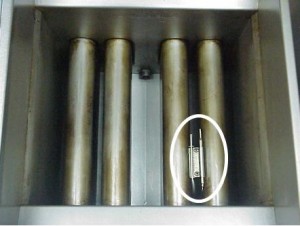Deep Fat Fryer Thermostatic Control Fires
Fryer Heat Element Operation
Deep fat fryers are particularly susceptible to poor mechanical maintenance. Thermostats and shut-off relays that are not properly maintained can fail, resulting in the burners continuing to heat the oil to autoignition temperatures.
Most fryers operate with two capillary type thermostats. These consist of a sealed reservoir of fluid (usually xylene) connected to a diaphragm and switch by a narrow copper tube. As the temperature increases, the liquid expands, causing movement of the diaphragm, which, in turn, pushes on a small switch and opens a set of contacts and shuts down the burners. In gas units, these contacts are in series with the pilot verification thermocouple. Opening the contacts de-energizes the electromagnet and a spring closes the main gas valve.
The capillary tubes are subject to breaking when the fryer is cleaned. When that happens, the fluid leaks out, and the thermostat no longer responds to heat. The fryer will keep working, because the contacts will stay closed. The temperature is then under the control of the high limit thermostat. The oil may smoke, but many restaurant operators keep on cooking. If the high limit switch were to fail, there will be a fire.
In some fryers, the high limit thermostat will include a “negative biased” reservoir that is slightly below atmospheric pressure, so that if the capillary tube breaks, the loss of negative pressure will open the circuit.
The fryer cannot operate in this condition; however, it takes only a minute to bypass the safety. If it is the high limit capillary that breaks first, and it is tampered with, the operating thermostat will control the oil temperature until the second capillary breaks. Then there is no control to stop the burners from continuing to operate. This will result in autoignition of the cooking oil.
A laboratory examination of the fryer can reveal that the safety device has been tampered with; there has been an overheating of an empty vat causing metal fatigue, and/or improper or inadequate maintenance of the unit has recently taken place.
See additional articles on philackland.com.
Phil Ackland has been in the field of commercial kitchen fire investigation and education for over 40 years. https://www.philackland.com/. He sits on the NFPA 96 committee, has been a qualified expert witness and is a consultant to attorneys and insurance companies. He has written a series of books on these systems. The most recent A Guide for Commercial Kitchen Fires – Prevention and Investigation. His seminars have been attended by 1000’s of fire inspectors and fire investigators. https://www.philackland.com/courses/
Mark Finck has extensive expertise in all aspects of commercial cooking equipment and a comprehensive background in kitchen operations. Mark has served on the NFPA 96, ASHRAE and other safety code committees. He is a subject matter expert in commercial kitchen ventilation, appliances and flame broilers. https://www.philackland.com/fire-investigation/the-associates/mark-finck/
Questions? Contact Us via our Form or 706-516-4176



